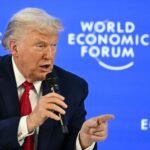Hyundai Motor CEO Chang Jaehoon (far right) takes over from Yoshinori Kanehana (far left), Chairman of Kawasaki Heavy Industries, as co-chair of Hydrogen Council. Sanjiv Lamba, CEO of Linde (second from left), also co-chairs the council (Courtesy of Hydrogen Council)
Hyundai Motor Group will expand its cooperation with global companies to increase its presence in the hydrogen value chain from production to distribution of the clean energy beyond developing hydrogen fuel cell vehicles.
Its hydrogen business will get a tailwind from policy support from the US state of Georgia, where the South Korean automotive group is slated to complete the construction of its electric and hybrid vehicle plant in October.
The new facility, dubbed Hyundai Motor Group Metaplant America, or HMGMA, will serve as Hyundai’s US logistics hub. Its parts and components will be transported by Hyundai’s XCIENT hydrogen trucks.
Its hydrogen push is also gaining steam after Hyundai Motor Co. Chief Executive Chang Jaehoon was appointed this week as co-chair of the Hydrogen Council.
He is taking over from Yoshinori Kanehana, chairman of Kawasaki Heavy Industries, Ltd., joining Sanjiv Lamba, CEO of Linde, to co-lead the council with no term limits.
Based in Brussels, Belgium, the council is the world’s largest hydrogen council of CEOs from 140 companies around the world, including Toyota, BMW, Saudi Aramco and Air Liquide, a French industrial gas firm in transition toward hydrogen energy.
With a combined market capitalization of $9 trillion, they have formed a 2 billion-euro ($2.1 billion) fund to invest in hydrogen projects.
On Monday, Brian Kemp, governor of Georgia, vowed to provide all-out support to Hyundai Motor Group’s EV and hydrogen car manufacturing facilities in the US state during a meeting in Seoul with CEOs from Hyundai Motor Co. and its sibling Kia Corp., as well as those from other manufacturing companies.
Georgia is Hyundai Motor Group’s US manufacturing hub. It is pumping $12.6 billion into building Hyundai Motor Group Metaplant America (HMGMA) in Bryan County in the state. The investment is its largest-ever spending on overseas operations.
“Georgia is trying new things in areas such as hydrogen and logistics,” Hyundai’s Chang told reporters before attending the Georgia Night event in Seoul on Monday.
“In Georgia, there are many Korean companies, including Hyundai Motor, so we discussed strengthening our cooperative relationship (with the state),” he said, asked about the topics of the meetings with the state governor and Korean business leaders.
BATTERIES
Hyundai is also said to be seeking to develop hydrogen and EV batteries beyond assembling battery packs.
On Monday, Hyundai and Kia signed a long-term agreement with Sociedad Química y Minera de Chile (SQM), the world’s No. 2 lithium mining company to secure lithium hydroxide from the Chilean miner.
Early this year, the two carmakers under Hyundai Motor Group entered into four-year supply contracts for lithium hydroxide with two Chinese lithium mining companies.
Hyundai Motor recently took over the hydrogen battery pack production facilities and their R&D employees from its affiliated auto parts company Hyundai Mobis Co. to take charge of both the development and production of battery management systems.
Those moves are fanning speculations that it might be preparing to advance into the battery production market.
Hyundai will pour 31.1 trillion won ($22 billion) into building a battery technology development center. Batteries account for 30-40% of EV manufacturing costs.
From 2031, it will source about half of its nickel needs from Korea Zinc Inc. to qualify its EV buyers for US subsidies under the US Inflation Reduction Act.
A concept image of Hyundai’s supercar (Courtesdy of Hyundai)
Hyundai is also setting its sights on Indonesia to spur its hydrogen push. To do so, it will join hands with Indonesia’s petroleum company Pertamina to produce hydrogen, the Indonesian government announced last month.
HYDROGEN VEHICLES ON THE PIPELINE
In the second half of this year, the carmaker plans to roll out car carrier trailers and refrigerator trucks fueled by hydrogen targeting the US market, about four years after it debuted its XCIENT hydrogen fuel cell truck.
It also plans to unveil a revamped model of NEXO, its first hydrogen fuel cell EV, this year, after its launch in 2018, while developing what would be the world’s first hydrogen-powered supercar for release in 2026
In 2023, hydrogen fuel car sales came in at 14,451 units in the world, about one-thousandth of the EV sales of 14.06 million units.
By Jin-Won Kim, Jae-Fu Kim and Jung-Eun Shin
Jin1@hankyung.com
Yeonhee Kim edited this article














